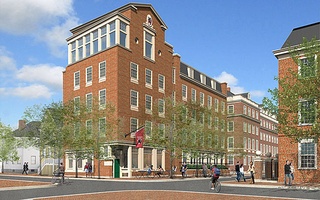{shortcode-d1be9ad3898c27d2907b6ce216b206b49ad8bae2}
During my undergraduate career, Winthrop House was my single-most important source of community. The nature of the randomly assigned Houses guaranteed a much appreciated diversity amongst my peers in the House. It was only fitting that the House staff mirrored this diversity, serving as resources for a variety of students. Ronald S. Sullivan, Jr. and Stephanie Robinson, our faculty deans, both exemplified and bolstered this diversity of backgrounds, interests, and, most of all, thought.
The recent announcement of Sullivan’s joining Harvey Weinstein’s legal team is very consistent with the thought, leadership, and open discourse I know the faculty deans to have fostered in Winthrop House. Regardless of my personal views on Weinstein and the accusations against him, I think Sullivan has the potential to improve and increase discourse in a way that benefits many of those who have critiqued his decision and, regardless, is entitled to and should be applauded for going against the grain at an institution known for being intellectually stimulating but not necessarily morally inclusive.
Overall, throughout my time at and after Harvard, I have learned key lessons that I consider now as I choose to respect, defend, and even appreciate Sullivan’s decision.
First, Sullivan and Robinson’s welcoming attitude of varied perspectives is rare, crucial, and has been displayed on prior occasions. This attitude should be commended. I recall one instance during my sophomore year at Harvard when then-Governor Nikki R. Haley was honored by the Harvard Foundation for leading the removal of the Confederate flag from her state’s Capitol building. Following outrage from students discontented by her race relations track record, including interns at the Harvard Foundation, there was an organized discussion held in Winthrop. With the Harvard Republican Club president playing a pivotal role in the meeting, alongside Harvard Foundation interns and Winthrop House Race Relations Tutors, the event had no shortage of diverse opinions.
This was an event Sullivan and Robinson were directly responsible for approving and encouraging, and indirectly for establishing Winthrop’s culture of dialogue and open-mindedness. Indeed, my views were changed by that event and hearing opinions different from mine, and my counterparts from the other side of the issue expressed similar sentiments.
Sullivan’s commitment to encouraging dialogue is illuminated in instances like these is even more commendable considering a key fact about Harvard’s campus — that students on campus have perpetually felt uncomfortable by the polarization and lack of dialogue. Just last month, yet another conservative on campus published an article with sentiments I can attest to being prevalent even when I started at Harvard almost a decade ago.
The visceral response to Sullivan’s professional decision is also indicative of the lack of dialogue on this campus. I would argue that even a person who vehemently disagrees with the views of this self-dubbed “lone conservative” or the accused Weinstein’s right to counsel should welcome the opportunity to associate with those defending them — an opportunity to learn from and potentially educate someone on the other side, whether morally or contractually. This open discourse is needed to change campus culture. Thus, Sullivan’s decision extends Harvard students a critical opportunity to learn of the importance of engaging with other viewpoints.
Outside of Harvard, this lack of dialogue is hurting the power of Harvard, its students, and its graduates to influence and improve the world around us.
I experienced this first-hand myself after enlisting in the U.S. Army National Guard immediately following my graduation from Harvard College. I went from a major institution saturated with liberal thought to one saturated with conservative thought. I have found that whether I posed a differing view when discussing whether transgender service members should be allowed or if I grimaced at the utterance of a racialized, gendered, or homophobic epithet during some activity with my fellow soldiers, my opinion was generally well-received, until it was remembered that I am a product of an institution that is not just liberally biased, but is monolithic enough to rescind offers to even just speak on campus from conservative thinkers like James “Jim” W. Gilchrist, Jr.
Only after I endured remarks about being a “snowflake” and retorted with an acknowledgement of the opposing perspective, explaining that I have worked to go beyond the Harvard mold to explore opinions different from my own (which contributed to my very decision to enlist) did they recognize the validity of my views. Regardless of whether my views were moderated by theirs to reach a middle ground or remained unchanged, I learned to foremost acknowledge the other perspective. This learning should be intrinsic to the Harvard education: We should leave Harvard with the ability to change hearts and minds, societies and standards of behavior because when we speak, people know we’re not only smart, but we’re open-minded.
Harvard has a moral responsibility to facilitate discourse that educates our students, provides us with a badge of open-mindedness akin to that we get for intelligence upon graduation, and ensures that people like Sullivan are appreciated as trailblazers in open discourse at best, or as a welcome opportunity to directly engage with the other side at worst. Harvard’s role as a thought leader in our society comes with a mandate for diversity of thought, and this is precisely why Sullivan and Robinson are exemplar faculty deans worthy of applause, not admonishment.
Faith A. Jackson ‘17 is a first-year student at Harvard Law School.
Read more in Opinion
The Deeper Message of Harvard’s Dining Hall Food















